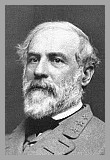The Character of Robert E. Lee


Farewell to the Army of Northern Virginia
by Robert E. Lee
After four years of arduous service, marked by unsurpassed courage and fortitude, the Army of Northern
Virginia has been compelled to yield to overwhelming numbers and resources.
I need not tell the survivors of so many hard-fought battles who have remained steadfast to the last that I
have consented to this result from no distrust of them; but feeling that valor and devotion could
accomplish nothing that could compensate for the loss that would have attended the continuance of the
contest, I determined to avoid the useless sacrifice of those whose past services have endeared them to
their countrymen. By the terms of the agreement, officers and men can return to their homes and remain
until exchanged.
You may take with you the satisfaction that proceeds from the consciousness of duty faithfully
performed, and I earnestly pray that a merciful God will extend to you his blessing and protection.
With an unceasing admiration of your constancy and devotion to your country, and a grateful
remembrance of your kind and generous consideration of myself, I bid you all an affectionate farewell.

The Character of Lee
by John Williams Jones
He possessed every virtue of the great commanders, without their vices. He was a foe without hate; a
friend without treachery; a private citizen without wrong; a neighbor without reproach; a Christian without
hypocrisy, and a man without guilt. He was a Caesar without his ambition; a Frederick without his
tyranny; a Napoleon without his selfishness; and a Washington without his reward. He was obedient to
authority as a servant, and loyal in authority as a true king. He was gentle as a woman in life; modest
and pure as a virgin in thought; watchful as a Roman vestal in duty; submissive to law as Socrates, and
grand in battle as Achilles.

He Lost a War and Won Immortality
by Louis Redmond
Even among the free, it is not always easy to live together. There came a time . . .
when the people of this country disagreed so bitterly among themselves that some of them
felt they could not go on living with the rest.
A test of arms was made to decide whether Americans should remain one nation or become two. The
armies of those who believed in two nations were led by a man named Robert E. Lee.
What about Lee? What kind of man was he who nearly split the history of the United States down the
middle and made two separate books of it?
They say you had to see him to believe that a man so fine could exist. He was handsome. He was
clever. He was brave. He was gentle. He was generous and charming, noble and modst, admired and
beloved. He had never failed at anything in his upright soldier's life. He was a born winner, this Robert E.
Lee. Except for once. In the greatest contest of his life, in the war beween the South and the North,
Robert E. Lee lost.
Now there were men who came with smouldering eyes to Lee and said: "Let's not accept this result as
final. Let's keep our anger alive. Let's be grim and unconvinced, and wear our bitterness like a medal.
You can be our leader in this."
But Lee shook his head at those men. "Abandon your animosities," he said, "and make your sons
Americans."
And what did he do himself when his war was lost? He took a job as president of a tiny college, with
forty students and four professors, at a salary of $1500 a year. He had commanded thousands of
young men in battle. Now he wanted to prepare a few hundred of them for the duties of peace. So the
countrymen of Robert E. Lee saw how a born winner loses, and it seemed to them that in defeat he won
his most lasting victory.
There is an art of losing, and Robert E. Lee is its finest teacher. In a democracy, where opposing
viewpoints regularly meet for a test of ballots, it is good for all of us to know how to lose occasionally,
how to yield peacefully, for the sake of freedom. Lee is our master in this. The man who fought against
the Union showed us what unity means.

 RETURN TO MENU
RETURN TO MENU






 RETURN TO MENU
RETURN TO MENU